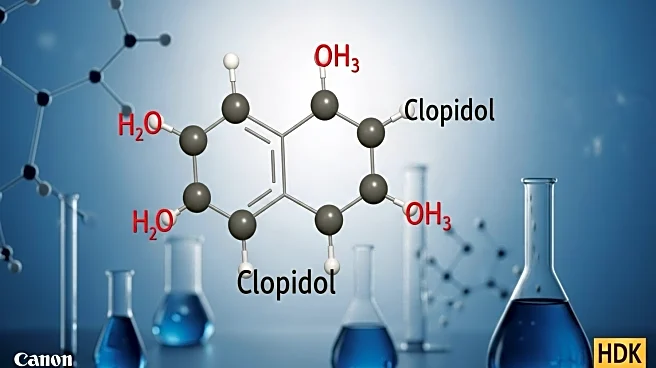What's Happening?
A recent study has focused on the depletion, metabolism, and risk assessment of clopidol in broilers. Clopidol is a veterinary drug used to prevent coccidiosis in poultry. The study validated analytical
methods to quantify residual concentrations of clopidol in various tissues, ensuring compliance with international standards. The research found that clopidol residues were primarily detected in the liver and kidneys of broilers, with significant depletion occurring within a day of administration. The study also identified metabolites of clopidol, which were detected in the kidney and liver shortly after dosing. The research provides a framework for detecting clopidol residues and assessing their potential risks to human health.
Why It's Important?
The findings of this study are significant for the poultry industry and public health. Understanding the metabolism and residue depletion of clopidol is crucial for ensuring food safety and compliance with regulatory standards. The study's results can help in establishing maximum residue limits (MRLs) for clopidol in poultry products, thereby protecting consumers from potential health risks. Additionally, the research highlights the importance of monitoring veterinary drug residues in food animals to prevent environmental contamination and ensure sustainable agricultural practices.
What's Next?
Further research is needed to characterize non-extractable residues (NERs) of clopidol, which pose risks to environmental and human health. The study suggests that more robust extraction methodologies are required to accurately assess these residues. Additionally, ongoing studies may focus on the long-term effects of clopidol residues in poultry and their implications for food safety regulations. Stakeholders in the poultry industry and regulatory bodies may use these findings to update guidelines and improve monitoring practices.
Beyond the Headlines
The study raises ethical considerations regarding the use of veterinary drugs in food animals and their impact on human health. It underscores the need for transparent risk assessments and the development of safer alternatives to current practices. The research also highlights the role of scientific studies in shaping public policy and industry standards, emphasizing the importance of evidence-based decision-making in food safety.










